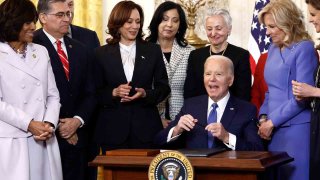
President Joe Biden signed an executive order Monday aimed at advancing the study of women's health by strengthening data collection and providing better funding opportunities for biomedical research while chiding Republicans for having “no clue about the power of women" but saying they're "about to find out” come November's election.
Women's health has long been underfunded and understudied. It wasn't until the 1990s that the federal government mandated women be included in federally funded medical research; for most of medical history, though, scientific study was based almost entirely on men.
“We still know too little about how to effectively prevent, diagnose and treat a wide array of health conditions in women,” said Dr. Carolyn Mazure, the head of the White House initiative on women’s health.
Today, research often fails to properly track differences between women and men, and does not represent women equally particularly for illnesses more common to them — which Biden suggested his order would help change.
“To state the obvious, women are half the population and underrepresented across the board. But not in my administration,” the president said, drawing raucous applause at a White House reception marking Women's History Month.
Biden said he’s long been a believer in the “power of research” to help save lives and get high-quality health care to the people who need it. But the executive order also checks off a political box during an election year when women will be crucial to his reelection efforts. First lady Jill Biden is leading both the effort to organize and mobilize female voters and the White House Initiative on Women’s Health Research.
The announcement comes as the ripple effects spread from the Supreme Court's decision that overturned federal abortion rights, touching on medical issues for women who never intended to end their pregnancies. In Alabama, for example, the future of IVF was thrown into question statewide after a judge's ruling.
U.S. & World
In his comments at the reception, Biden didn't mention by name former President Donald Trump, who is now running to reclaim the White House. Instead, he referred to “my predecessor” who had been “bragging about overturning" the Roe v. Wade decision that had guaranteed the constitutional right to abortion.
The president suggested that would hurt Trump and the GOP during this fall's election, saying, “You can’t lead America with old ideas and take us backward."
Further leaning into politics, Biden said his administration has “turned around the economy because we focused on women,” noting that female unemployment had fallen and the number of women-owned small businesses had increased.
He said his administration has ensured that “women can access jobs in sectors where they’ve been historically underrepresented” and said he'd told leaders from some of the nation's top labor unions that he wants to see more women and minorities in their ranks.
Women were a critical part of the coalition that elected Biden in 2020, giving him 55% of their vote, according to AP VoteCast. Black women and suburban women were pillars of Biden’s coalition while Trump had a modest advantage among white women and a much wider share of white women without college degrees, according to the AP survey of more than 110,000 voters in that year’s election.
Vice President Kamala Harris, women's health advocate Maria Shriver and the first lady also addressed the reception.
“Finally women will get the health care we deserve,” Jill Biden said, saying the order signed Monday was “without precedent.”
Harris drew strong applause for noting that she “stood before you as the first woman vice president of the United States” and talked about visiting an abortion clinic in Minnesota last week.
“There are those who are intent on dragging us backward,” the vice president said of Republican states that have limited access to abortion.
“We all face a question: What kind of country do we want to live in?” Harris said. "A country of liberty, freedom and rule of law? Or a country of disorder, fear and hate?”
Shriver joked that this is probably the first time a president has signed an executive order that mentions menopause and said the action could only be taken “by a president who respects women.”
The National Institutes of Health is also launching a new effort around menopause and the treatment of menopausal symptoms that will identify research gaps and work to close them, said White House adviser Jennifer Klein. NIH funds a huge amount of biomedical research, imperative for the understanding of how medications affect the human body and for deciding eventually how to dose medicine.
Some conditions have different symptoms for women and men, such as heart disease. Others are more common in women, like Alzheimer’s disease, and some are unique to women — such as endometriosis, uterine cancers and fibroids found in the uterus. It's all ripe for study, Mazure said.
And uneven research can have profound effects; a 2020 study by researchers at the University of Chicago and University of California, Berkeley, found that women were being overmedicated and suffering side effects from common medications, because most of the dosage trials were done only on men.
The first lady announced $100 million in funding last month for women's health.



